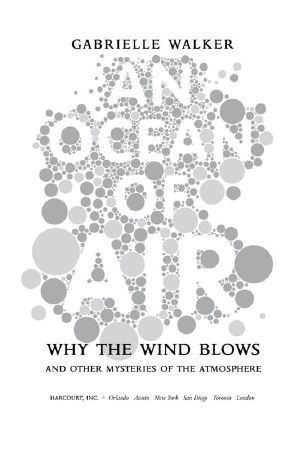An Ocean of Air

- Authors
- Walker, Gabrielle
- Publisher
- Mariner Books
- Tags
- science , history
- ISBN
- 9780151011247
- Date
- 2007-08-06T00:00:00+00:00
- Size
- 1.08 MB
- Lang
- en
We don’t just live in the air; we live because of it. It’s the most miraculous substance on earth, responsible for our food, our weather, our water, and our ability to hear. In this exuberant book, gifted science writer Gabrielle Walker peels back the layers of our atmosphere with the stories of the people who uncovered its secrets:
• A flamboyant Renaissance Italian discovers how heavy our air really is: The air filling Carnegie Hall, for example, weighs seventy thousand pounds.
• A one-eyed barnstorming pilot finds a set of winds that constantly blow five miles above our heads.
• An impoverished American farmer figures out why hurricanes move in a circle by carving equations with his pitchfork on a barn door.
• A well-meaning inventor nearly destroys the ozone layer.
• A reclusive mathematical genius predicts, thirty years before he’s proved right, that the sky contains a layer of floating metal fed by the glowing tails of shooting stars.
**
### From Publishers Weekly
Most of the time we hardly notice that we're moving through air. But when a storm system whips it into a whirling mass that grows into a tornado or a hurricane, then the air around us makes headlines. Science consultant Walker (*Snowball Earth*) presents a lively history of scientists' and adventurers' exploration of this important and complex contributor to life on Earth, from Galileo's early attempts to show that it has weight to the explorations by 20th-century scientists Oliver Heaviside and Edward Appleton of the ionosphere, which acts as a giant mirror bouncing radio waves from one side of the globe to another. Walker provides readers with easy-to-follow discussions of the science behind the discovery that carbon dioxide levels are rising exponentially; the theoretician who left her computer for Antarctica and discovered a huge ozone hole created by chlorofluorocarbons; why hurricanes form only in the tropics and why global warming may lead to more violent storms. She goes far afield at times, spending too much time on the Van Allen belts, for instance, but readers will find this informative book to be a breath of fresh air. *(Aug.)*
Copyright © Reed Business Information, a division of Reed Elsevier Inc. All rights reserved.
### From Bookmarks Magazine
Although Gabrielle Walker, author of *Snowball Earth* (2003), holds a Cambridge doctorate in chemistry, her ear for storytelling is perfect for popular science. One critic praises her lyrical style; others praise her use of detail, anecdote, and science that wouldn't be out of place in Meteorology 101. Critics inevitably compare Walker to Dava Sobel (*Longitude*; *Galileo's Daughter*; *The Planets*, *** Jan/Feb 2006), one of the genre's most popular writers. Walker has honed her skills as a contributing editor of *Scientific American*, and her breezy tone fits her subject perfectly. Even though her choice to start from square one may frustrate readers with some previous knowledge in the area, Walker has penned an engaging, readable book-nothing too heavy, and worth the reader's every breath.
*Copyright © 2004 Phillips & Nelson Media, Inc.*